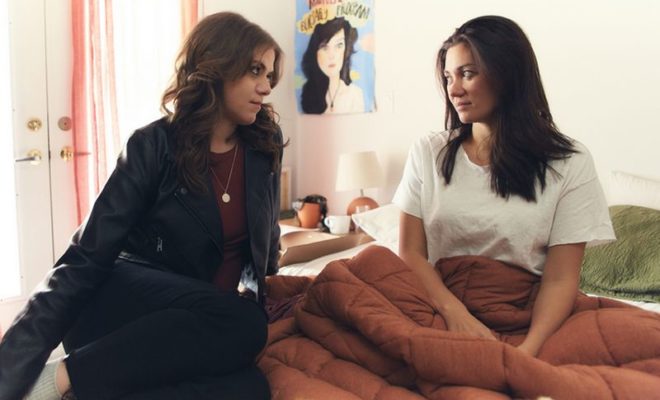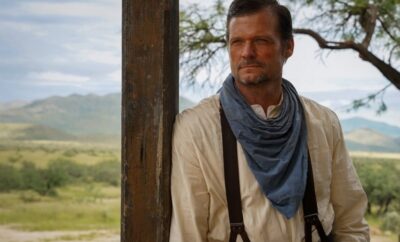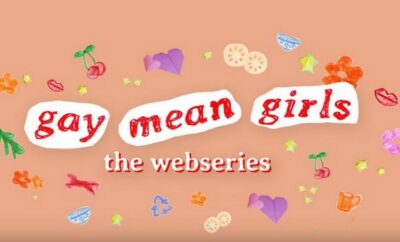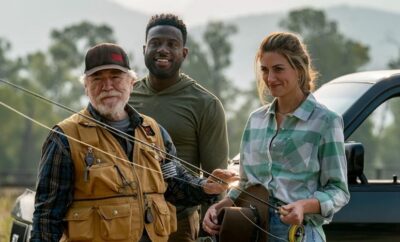
Interviews
Vanessa Matsui and Kaniehtiio Horn – Ghost BFF
By: Lisa Steinberg
Q) Season One of the series grazed the surface with regards to mental health issues, and it goes even deeper with mindfulness in season two. It really normalizes medication and how anxiety affects us individually. It feels as though the conversations end up directing exactly how the audience relates and feels. What points and perspective were important for you to highlight with regardless the direct address of mindfulness with this?
Vanessa: Yeah, I mean definitely. A big part of wanting to create this show in the first place was to help destigmatize anxiety, depression and suicide so that people wouldn’t feel so alone if they were going through those things. But also, so they could feel open to talk about it because I think that talking can genuinely save lives. Season One goes a bit deeper because Amy is coming to terms with her own PTSD and anxiety around what happened with her best friend. I think that she is kind of confronting these demons that have been inside of her for a long time.
Q) Amy has felt stifled in her art after Tara’s passing, but reconnecting with her spirit has allowed a new expressionism that we see developed. Talk about how art and creative expression is an outlet for the stages of grief and the way that we process them.
Vanessa. That’s a great question. It’s funny. I never purposefully set out to say that, but I guess just in my own life art has been such an important outlet for me. It really helps me digest things that I am processing that happen in my own life. I don’t know, Tiio, do you feel the same way?
Kaniehtiio: Yeah, well for me personally, once I started to actually work on my things and actually being a part of “Ghost BFF” and seeing how Vanessa really didn’t let anything deter her from making this was really encouraging and inspiring. It was really encouraging and inspiring to see her finally get it on its feet. It was one of the things that kind of encouraged me with my own life and my own creativity to start working on my own stuff. I started my own podcast and then I started researching and really looking into something that I went through when I was a child. I think that art and podcasting and interviewing has been my outlet and I definitely agree that it is definitely therapeutic. I feel like it goes hand in hand. It’s almost like I forgot that I had this outlet and that I could be creative. When you get up off your ass and start to sit down and do it, it’s like with my podcast “Coffee with My Ma.” I was just like, “You know what? I am going to do this.” I didn’t even think that five people would hear it, but it is something that has sort of become big-ish in the podcasting world. It’s been so validating, I guess. It’s been a great journey.
Q) There is this talk of closure and unfinished business that we see from Tara’s character, but also with Amy at the same time. Tara seems to think she has unfinished business with everyone else but Amy. Talk about how this idea has different meanings with these two? Why is Tara oblivious to this when it comes to Amy?
Kaniehtiio: I think Tara’s always been self-involved. She’s extremely self-involved. She is the friend who I think could be manipulative. She’s lovable, but I think that manipulation and that self-involvement is also because she doesn’t want to face anything that she has gone through. Does that make sense? Someone is self-involved, but they still don’t want to look at what they actually have to do that? She won’t deal with the fact of what she did in front of Amy. It’s also really hard to say you’re sorry. It’s hard to admit that you hurt someone.
Vanessa: Exactly. I think that’s a big part of Tara’s journey. There is this side to her that she has hurt these people, and I think that Tara is only scratching the surface of what could happen with her character later. Also, I do have to say in Tara’s defense, I think Tara’s also the truth-sayer of the show. She also doesn’t want Amy to be a victim. She even says at one point, “I am dead, you’re alive. You still have a chance.” I think that’s really important for Tara because she doesn’t want Amy to necessarily dwell on the past. She wants Amy to take charge of her life and grow up in a lot of ways. But, yeah, she can also be manipulative AF.
Q) We loved the relationship with Amy and her mom. There was no judgment, it was just unconditional and embracing love. A lot of rocky relationships within the series, but seeing such a supportive stable mother daughter dynamic on screen was a delight. And, of course, we love Jean Yoon! This was juxtaposed to Tara’s tumultuous relationship with her mom. How do these familial bonds form these women we see on screen?
Vanessa: In between Season One and Season Two I had a baby, which obviously changed my life. I had no idea what moms go through and how much our moms love us. The love that I have for my daughter is unreal. I just wanted to show that. I think that sometimes the mother/daughter relationship, while it is very complicated, there is so much love there. Amy’s mom loves her and is actually really encouraging of her art when other people aren’t and the men in her life aren’t, which I also find interesting.
Kaniehtiio: I think Tara’s mom has a dysfunctional love with how she tries to show it. I think she also means well, and I think that Tara learns a lot of her manipulative ways from her mother. But there is still that dysfunctional love there. I know so many people who have that relationship with their mother. I don’t. I have very much like Amy’s relationship with her mother. But I definitely know people who have Tara’s relationship with her mother.
Q) This season we see topics like abortion explored and it really gives a lot of well-informed counter viewpoints about it. What do you hope that viewers take away from this discussion and the significance of seeing women supporting women in this moment?
Kaniehtiio: I think it’s the same with the mental health aspect of the show, I think abortion really seriously needs to be normalized. I think that with everything that women go through it needs to stop being a taboo subject. We go through all of that stuff. I try and openly talk about it. I had an abortion. I had my reasons and I stand by my reasons. I will openly talk about that. I think that’s important because I don’t think that we should feel ashamed about that sort of stuff. It’s our health. It has to do with our mental health as well.
Vanessa: I agree. One hundred percent. Even in the writing process while we were writing this, all that stuff was happening in the Southern states about abortion rights being taken away. I was like, this is 2019, this is out of control. We need to talk about it.
My original idea was for Amy to have the baby. It was actually my friend Brent who wrote episode two, we were looking at post it notes on the wall and he was like, “I think Amy needs to have an abortion.” As soon as he said that, I knew he was right. I think it makes sense for her character and for the times that we are living in. I wanted to show that Amy did take Tara’s advice. She is going after her dreams, and those dreams might not look like what they are supposed to look like, but it’s her life. You gotta get yours in life!
Q) Is there anything else about the series you want to make sure that we mention? Or about a possible Season Three?
Vanessa: I would love for people to watch and get in touch with me. I would love to know what people think. I would love an incarnation of the series to appear on television and to do a third season of “Ghost BFF” for TV. That would be my big dream.
Kaniehtiio: That would be amazing. Exactly what Vanessa said. I would love season three to be big. Big money! Come on big money!





You must be logged in to post a comment Login